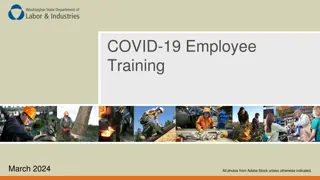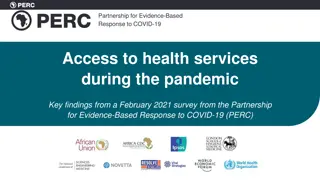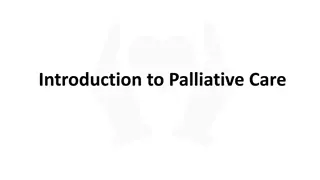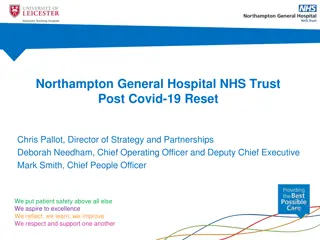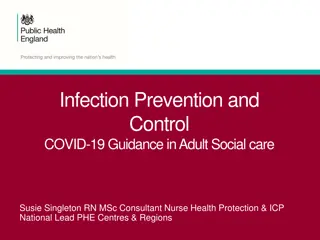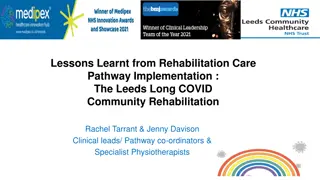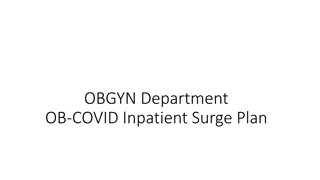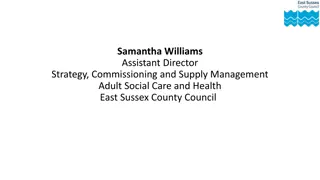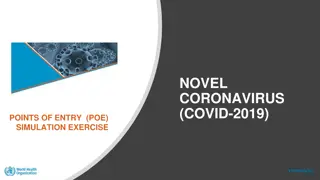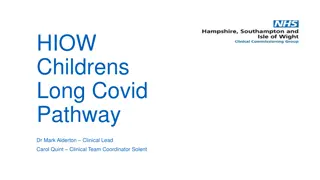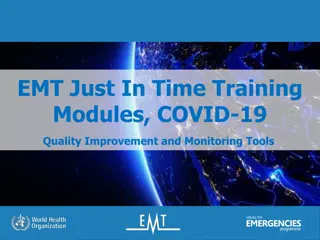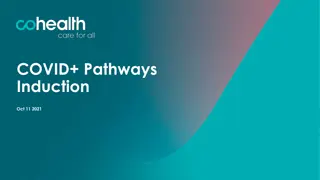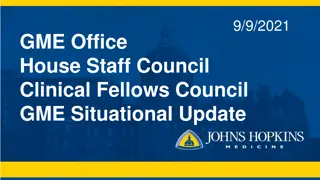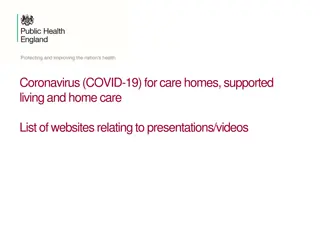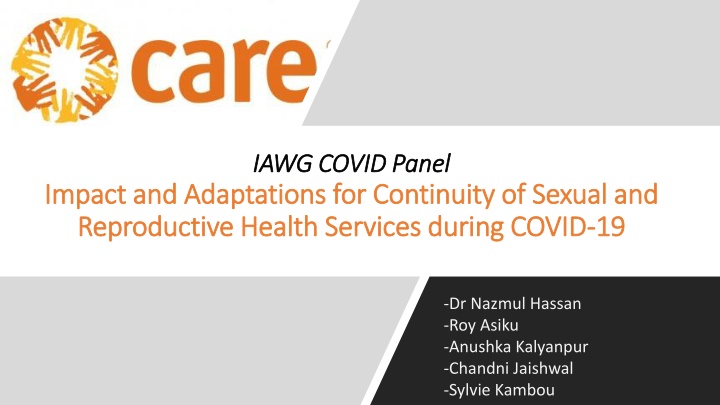
Impact and Adaptations for Continuity of Sexual and Reproductive Health Services during COVID-19
Explore key takeaways from a panel discussion on the impact and adaptations in sexual and reproductive health services during COVID-19, including insights from case studies in Cox's Bazar, Bangladesh, and Uganda. Learn about challenges, barriers, key learnings, and adaptations to ensure continuity of services.
Download Presentation

Please find below an Image/Link to download the presentation.
The content on the website is provided AS IS for your information and personal use only. It may not be sold, licensed, or shared on other websites without obtaining consent from the author. If you encounter any issues during the download, it is possible that the publisher has removed the file from their server.
You are allowed to download the files provided on this website for personal or commercial use, subject to the condition that they are used lawfully. All files are the property of their respective owners.
The content on the website is provided AS IS for your information and personal use only. It may not be sold, licensed, or shared on other websites without obtaining consent from the author.
E N D
Presentation Transcript
IAWG COVID Panel IAWG COVID Panel Impact and Adaptations for Continuity Impact and Adaptations for Continuity of of Sexual and Reproductive Health Services during COVID Reproductive Health Services during COVID- -19 Sexual and 19 -Dr Nazmul Hassan -Roy Asiku -Anushka Kalyanpur -Chandni Jaishwal -Sylvie Kambou
(1) Key takeaways based on data triangulation from: A rapid survey conducted with 32 CARE Country Offices Trend analysis of SRHR indicators between January to June 2020 across projects in several fragile contexts (Family planning a key proxy indicator) Complemented by situation reports across CARE globally. Methods: (2) Case Studies: Cox-Bazar, Bangladesh and Uganda
25/32 Countries - Rumors, Stigma or Fear related to COVID-19 Challenges/ Challenges/ Barriers to access Barriers to access to SRH services: to SRH services: (CARE Country (CARE Country Offices) Offices) 22/32 Countries -Lack of PPE for Providers and Community Members 22/32 Countries - Increased Financial Constraints 18/32 countries - Lack of personnel to Provide SRH/GBV services (mobility, diversion of personnel as key factors)
Key learning: 1. Coxs Bazaar Key learning: 1. Cox s Bazaar Importance of risk communication & community engagement not only for COVID but also for SRH topics during COVID Adolescents services are disproportionately impacted:
COX BAZAR, BANGLADESH: Key adaptations to ensure continuity of COX BAZAR, BANGLADESH: Key adaptations to ensure continuity of SRH services SRH services ENHANCED OUTREACH; MOBILE CLINIC MISP PPE & TRAINING On Infection Prevention & Control For FLHWs ADAPTED PATIENT FLOW ADAPTED AWARENESS APPROACHES TESTING & REFERRAL MULTI-SECTORAL/AGENCIES COLLABORATION
Key learning: 2. Uganda: Social Accountability & Rights Key learning: 2. Uganda: Social Accountability & Rights- -based Approaches Approaches based - Remote provision of services - Advocacy for improving gaps - Enhanced empowerment and mandate of community and women's groups Disproportionate impact on refugees, women, adolescent girls and other marginalized groups COVID- 19 Pandemic Hits in March - Building human rights literacy
Uganda: SRHR Services Uganda: SRHR Services Survey conducted in April/May 59% of WRA have been affected by the COVID-19 crisis 34% did not feel safe while accessing services 36%don t have the right information to protect them selves FP Users: Uganda ANC: Uganda 270 158 247 236 139 138 214 126 117 183 170 155 82 62 Clear decline in services in April JANUARY 2020 FEBRUARY 2020 MARCH 2020 APRIL 2020 MAY 2020 JUNE 2020 JULY JANUARY 2020 FEBRUARY 2020 MARCH 2020 APRIL 2020 MAY 2020 JUNE 2020 JULY Protection from COVID-19 70% 66% 80% 64% 60% 36% 34% 34% 40% 20% 0% Yes No Yes No Yes No At facilities visited, did you feel safe & protected from COVID-19 Do you have enough/right information to protect yourself from COVID Do you know what to do if you get an emergency at night
Adaptations: Uganda Adaptations: Uganda Local level- engaging closely with local councils' leaders Gaining support in sharing the information Remote provision of psychosocial support and SRH (ANC, PNC, FP) services Communication such as Boda-Boda talk and Megaphones National level: Increase in the participation of women in the COVID task forces to raise voices of women Safe means of transport and strengthening referral systems Coordinated approaches to mitigate the three delays Health System Strengthening: Train health workers COVID-19 guidelines Support provision of adequate supply of commodities PPE, Drugs and other Empowering village health teams Free and safe movement of health service providers Increase human resources to address the workload.
Key learning : 3. SAFPAC Key learning : 3. SAFPAC Initiative: Investment Emergency Preparedness Emergency Preparedness on SRHR Initiative: Investment Case for on SRHR Case for
Keys Lesson Learned & Adaptations: Keys Lesson Learned & Adaptations: Digitization of communication and of provision of services; 30 Countries Case and voucher assistance to overcoming financial barriers; 16 Countries Accountability and empowerment of community-based and women s groups (including expanded community-based distribution of commodities); 14 Countries Leveraging community groups; 7 Countries Risk communication and community engagement are crucial Targeted approaches even beyond the initial emergency phase (continuity of services for adolescents) Mobile services were key to improving access; in some contexts, even increasing service uptake than prior to COVID-19 ( Iraq + Butembo, DRC) In fragile contexts, COVID-19 is only one of several factors impact service utilization Investment case for SRH and pandemic preparedness
THANK YOU Most importantly to our fearless frontline health workers!
Uganda: Case Study Human Rights Based accountability approaches Refugee and marginalized population/groups Lockdown in various degree- significant barriers Duty bearers and rights holders- make complaints, provide feedbacks and generate local solutions Increases engagement of DB and RH Training on human rights accountability for SRHR Implementing remote strategies Building human right literacy Advocacy for improving gaps identified
IMPACT OF COVID-19 ON SRHR SERVICES in Uganda Has COVID-19 situation affected your access to SRHR Services 59% of WRA have been affected by the COVID-19 crisis 34% did not feel safe while accessing services 36%don t have the right information to protect them selves No 41% Yes 59% PNC: Uganda Protection from COVID-19 204 210 206 203 70% 174 66% 64% 80% 159 149 60% 36% 34% 34% 40% 20% 0% Yes No Yes No Yes No At facilities visited, did you feel safe & protected from COVID-19 Do you have enough/right information to protect yourself from COVID Do you know what to do if you get an emergency at night JANUARY 2020 FEBRUARY 2020 MARCH 2020 APRIL 2020 MAY 2020 JUNE 2020 JULY
COX-Bazar, Bangladesh Adolescent girls and women of reproductive age of Rohingya community. Four health posts and fourteen outreach mobile clinics health teams. Minimum Initial Service Package (MISP) Sexual reproductive health service continued. Coordination and collaboration with government, health sector, SRH subsector and Community health working group as well as other relevant sector and agencies Approximately reached: 20000, Camp: 11 to 16.
Strategies/efforts Training/orientation on infection prevention to 120 frontline health workers. PPEs to the frontline health workers Covid-19 awareness message- 15135 people Suspected Covid-19 case referral for testing, isolation and treatment. Hand washing facility installed
3. Key learning from SAFPAC: Investment case for emergency 3. Key learning from SAFPAC: Investment case for emergency preparedness on SRHR preparedness on SRHR Sharp Decline in the Service Utilization; lock Decline in service utilization Services utilization in DRC remain relatively

